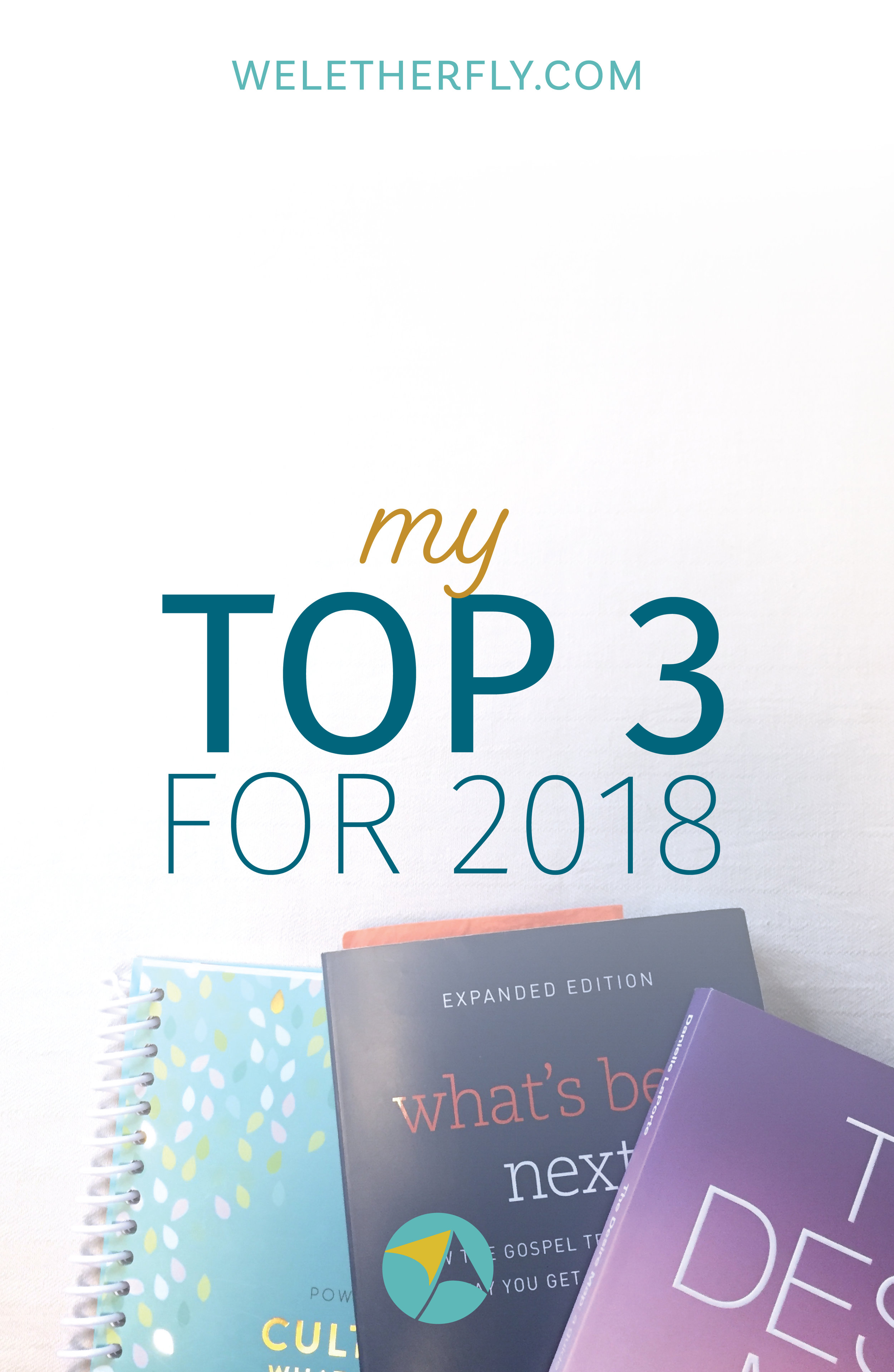My Top 3 for 2018
Are you completely over the “oh-my-gosh-it’s-January-1-and-I-gotta-make-all-the-plans-and-set-all-my-goals” freak out phase yet?
Well, are you? Good. Me too.
Yes, I’ve done some planning, and, yes, that can be a really good thing, but I’m not always the best at it. (One week I’ll meal plan and the next week we eat pb&j. Just sayin’.) It’s definitely something I’ve been aiming to be more intentional with lately, but the first 2 weeks of January can feel like so much striving sometimes.
I’m also not the fastest reader. I LIKE reading, but what I REALLY like is knitting, and I haven’t mastered doing both at once (seriously, there are people who can do this!). So I have to be really interested, or a book is very highly recommended, for me to put down my needles and read. Which also means I don’t recommend books lightly, just in case you’re like me and have other stuff to do too.
Over 2017 I read a short stack of books, all of which I liked. But there were 3 special books that have made a huge impact on me. Since the question of the month on Facebook seems to be “what books do you recommend?”, here are my top 3.
If I had to categorize them, they’d fall somewhere under the heading of “introspection/productivity/motivation/goals." They cover both business and personal life, which I count as a double win because I need help with both. They are deep books that require some deep work, if you really want to get the most bang for your buck. Purchase them so you can mark them up. I started one as a library copy, got part way through Chapter 1, and quickly hopped my fingers over to Amazon because I could tell this one was a keeper!
“Marking up a book is not an act of mutilation but of love.”
– Mortimer Adler
So grab your pencil or highlighter.
Here are my top 3 book recommendations for 2018.
I’ve listed these in a very specific order. It’s the order I happened to read them in, which is also the order I recommend because each one (unknowingly at the time) built upon the previous.
Big idea: Instead of setting and chasing goals for the sake of the goal or checking something off your list, first answer the question “how do I want to feel?” Once you determine your Core Desired Feelings (CDFs), you can then set goals and even make the smallest daily decisions in a way that nurtures those feelings and, in turn, allows for deeper joy and setting goals that matter.
Decisions that are guided by your heart give you joy and satisfaction along the way, not just in the final destination. It doesn’t mean that you park your brain and follow your feelings while you run roughshod over everyone else to get what you want. It doesn’t mean that we drum up a few feel-good feelings and live in ignorant bliss when life is going sideways. Quite the opposite. It means that we can make choices and respond with dignity and grace, choosing how to respond in each situation. As with all LaPorte’s writing, this book is very woo-woo, and while I can’t say I agree with every word of it, I certainly loved and benefited from the overarching themes. The first half of the book is called “Theory” and the second half is the “Workbook” where you dig deep and put into practice what you’ve read.
“Be curious. Come to life.”
Why I love it: I worked through the entire book at the beginning of 2017. Even though I had written my CDFs on several post-it notes, by November I had definitely lost sight of every. single. one. While I was feeling pretty overwhelmed and miserable, I stumbled across one of those post-its and quickly realized that I was feeling the exact opposite of how I really wanted to feel. So for 2018 I’ve pulled those notes out again and worked them into my weekly review so that I don’t lose sight so quickly this year.
Big idea: True productivity is not about getting more things done but about getting the right things done, and the Bible has a lot to say about how we do this.
Yes, this book is written from a solid biblical perspective, which is exactly why I love it so much. It has become my #1 recommendation, and if you’re tempted to take a “pass” because of its Christian viewpoint, please reconsider. Regardless of your worldview or religious affiliation, this book is absolute genius — short, digestible chapters, practical application, deep insights, and wisdom from some of our most respected thinkers like Stephen Covey, David Allen, Tim Ferriss, and Seth Godin, to name a few. Gospel-driven Productivity (GDP, as Perman calls it) is ultimately about being more productive so that we have more available time, not to sit on the beach and drink margaritas but to serve others and affect real, global, lasting change. It’s encouraging, motivating, and utterly practical, giving (among many things) a step-by-step plan called DARE — define, architect, reduce, and execute.
“Be creative, competent, and audacious in doing good for others, both where you are and around the world.”
Why I love it: Of course, I’ve heard about writing out your personal mission statement, principles, beliefs, and such, but I’ve never done it. Until now. Perman gives examples of how to do it and why you should do it. (I’m all about the “why.”) I read this book for the first time last Autumn, marking it up everywhere. Now I’ve finished it a second time, diving into the practical exercises. I especially appreciate his breakdown of a daily and weekly workflow and his understanding that getting “creative” work done differs from other work and doesn’t fit into a “normal” schedule like other work does. I’m not exaggerating when I say What’s Best Next has been transformational. Don’t bother with the library copy like I did at first; you’ll want your own to take notes in! There’s also a website at www.whatsbestnext.com where you can check out excerpts from the book and other helpful resources.
Big idea: Set good goals and then make a plan to make them happen, little by little, one step at a time.
While not a book in the traditional sense, I’m throwing it in this category regardless. (Hey, my blog, my rules.) PowerSheets are all about strategic goal setting, so the beginning section is more of that deep dive work — being grateful for how you’ve grown, uncovering what you want to make a priority in your life and/or business, why it’s important to you (there’s that “why” again), and then setting goals and mapping them out in small, doable steps. It’s all about progress over perfection and grace instead of comparison.
“Gratitude changes everything and will show you just how far you’ve come.”
Why I love it: I’ve actually owned PowerSheets for a couple years but hadn’t used them because I always felt paralyzed when it came to putting pen to paper. This year, I joined the PowerSheets Facebook community as they worked through what’s called “Prep Week” in November. It finally became doable when broken down into smaller chunks, plus I find it easier when I know there are others in the same boat. This dovetailed beautifully with What’s Best Next, and I found each influencing the other as I worked through what really mattered to me and what I wanted to make a priority in 2018.




